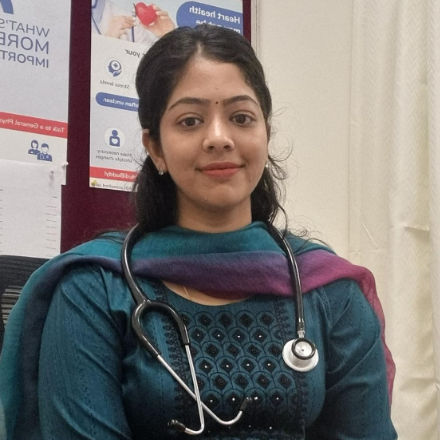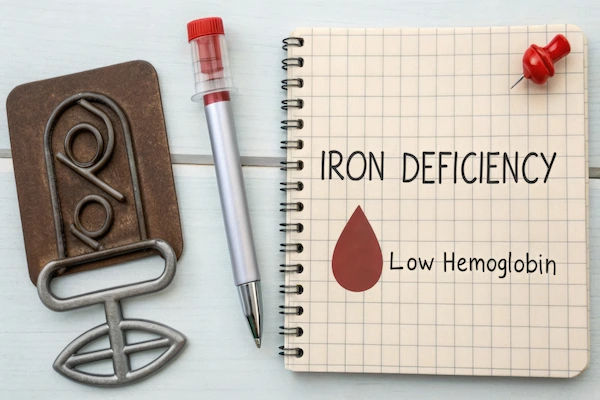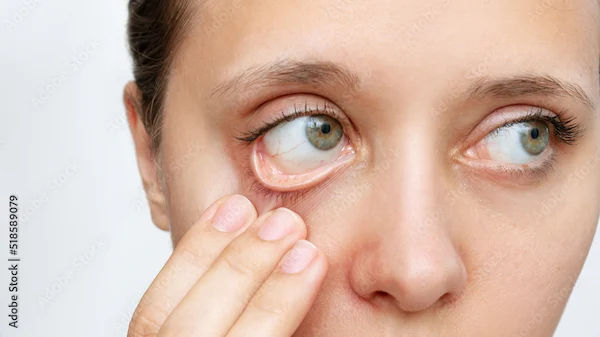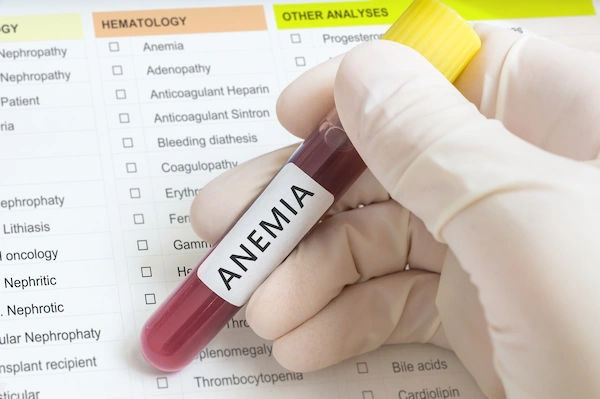Iron Deficiency Anaemia Overview
Know about iron deficiency anaemia, common symptoms, causes, how it affects your health, diagnosis and treatment with management of anaemia.

Written by Dr. Rohinipriyanka Pondugula
Reviewed by Dr. Shaik Abdul Kalam MD (Physician)
Last updated on 13th Jan, 2026

Introduction
Iron deficiency anaemia is one of the most common types of anaemia, affecting millions of people worldwide. If you or someone you know has been diagnosed with this condition, you might have questions about what it means, how it affects your health, and what you can do to manage it.
This guide will help you understand iron deficiency anaemia in simple terms and provide practical tips for improving your health.
What Is Iron Deficiency Anaemia?
Iron deficiency anaemia occurs when your body doesn’t have enough iron to produce haemoglobin, a protein in red blood cells that carries oxygen from your lungs to the rest of your body. Without enough haemoglobin, your tissues and organs don’t get the oxygen they need, leading to fatigue, weakness, and other symptoms.
Consult a General Practitioner for Personalised Advice
Common Symptoms of Iron Deficiency Anaemia
The signs of iron deficiency anaemia can develop slowly, making them easy to overlook.
Some common symptoms include:
- Fatigue and weakness – Feeling unusually tired even after rest.
- Pale skin – Especially noticeable in the face, inner eyelids, or nails.
- Shortness of breath – Even with mild physical activity.
- Dizziness or lightheadedness – Due to low oxygen levels in the brain.
- Cold hands and feet – Poor circulation caused by low haemoglobin.
- Brittle nails and hair loss – Iron is essential for healthy hair and nails.
- Unusual cravings (Pica) – Such as ice, clay, or dirt (a rare but possible symptom).
- Headaches and difficulty concentrating – Due to reduced oxygen supply to the brain.
If you experience these symptoms, it’s important to consult a doctor for proper diagnosis and treatment.
What Causes Iron Deficiency Anaemia?
Several factors can lead to low iron levels in the body:
1. Poor Dietary Intake – Not eating enough iron-rich foods (like meat, beans, and leafy greens).
2. Blood Loss – Heavy menstrual periods, ulcers, or internal bleeding.
3. Pregnancy – Increased iron needs for the growing baby.
4. Digestive Disorders – Conditions like celiac disease or stomach surgeries can reduce iron absorption.
5. Chronic Diseases – Kidney disease or inflammatory conditions may interfere with iron use.
How Does Iron Deficiency Affect Your Health?
If left untreated, iron deficiency anaemia can lead to:
- Weakened immune system – Making you more prone to infections.
- Heart problems – The heart has to work harder to pump oxygen, leading to irregular heartbeat or heart failure in severe cases.
- Delayed growth in children – Affecting physical and mental development.
- Complications in pregnancy – Increasing risks of premature birth or low birth weight.
How Is Iron Deficiency Anaemia Diagnosed?
Your doctor may recommend:
- Blood tests (Complete Blood Count – CBC, Ferritin levels) to check haemoglobin and iron stores.
- Additional tests (if needed) to find the underlying cause (e.g., colonoscopy for internal bleeding).
- If you suspect you have iron deficiency anaemia, you can book a blood test through Apollo 24|7 for quick and accurate results.
Consult a General Practitioner for Personalised Advice
Treatment & Management of Iron Deficiency Anaemia
1. Iron Supplements
- Your doctor may prescribe iron tablets or syrups.
- Take them with vitamin C (orange juice) to improve absorption.
- Avoid taking iron with milk, tea, or coffee, as they block absorption.
2. Dietary Changes
Iron-rich foods:
- Heme iron (easily absorbed): Red meat, poultry, fish.
- Non-heme iron (plant-based): Spinach, lentils, beans, tofu, nuts, and fortified cereals.
- Vitamin C-rich foods: Citrus fruits, tomatoes, bell peppers—help boost iron absorption.
- Limit tea/coffee with meals – They contain compounds that reduce iron absorption.
3. Treating Underlying Causes
If blood loss is the cause (e.g., heavy periods, ulcers), treating the root issue is essential.
4. Lifestyle Adjustments
Exercise moderately – Helps improve circulation, but avoid overexertion if severely anaemic.
Stay hydrated – Supports overall blood health.
When to See a Doctor?
Consult a healthcare provider if:
- Symptoms persist despite dietary changes.
- You experience severe fatigue, chest pain, or rapid heartbeat.
- You’re pregnant or have a chronic condition affecting iron levels.
Final Thoughts
Iron deficiency anaemia is manageable with the right diet, supplements, and medical care. By recognising the symptoms early and making simple lifestyle changes, you can regain your energy and improve your overall well-being.
Consult a General Practitioner for Personalised Advice
Consult a General Practitioner for Personalised Advice

E Pradheep
General Physician/ Internal Medicine Specialist
38 Years • MBBS
Bengaluru
Apollo Clinic, Sarjapur Road, Bengaluru
Dr. Srilekhya
Internal Medicine Specialist Diabetologist
10 Years • MBBS, MD (GENERAL MEDICINE)
Bengaluru
Apollo Medical Center, Marathahalli, Bengaluru

Dr. Rajesh R
General Practitioner
24 Years • MBBS
Bengaluru
Maruti Polyclinic and dental care, Bengaluru

Dr Aswathy D C
General Practitioner
6 Years • MBBS
Bangalore
Apollo Clinic Bellandur, Bangalore

Dr. Anand Ravi
General Physician
2 Years • MBBS
Bengaluru
PRESTIGE SHANTHINIKETAN - SOCIETY CLINIC, Bengaluru
Consult a General Practitioner for Personalised Advice

E Pradheep
General Physician/ Internal Medicine Specialist
38 Years • MBBS
Bengaluru
Apollo Clinic, Sarjapur Road, Bengaluru
Dr. Srilekhya
Internal Medicine Specialist Diabetologist
10 Years • MBBS, MD (GENERAL MEDICINE)
Bengaluru
Apollo Medical Center, Marathahalli, Bengaluru

Dr. Rajesh R
General Practitioner
24 Years • MBBS
Bengaluru
Maruti Polyclinic and dental care, Bengaluru

Dr Aswathy D C
General Practitioner
6 Years • MBBS
Bangalore
Apollo Clinic Bellandur, Bangalore

Dr. Anand Ravi
General Physician
2 Years • MBBS
Bengaluru
PRESTIGE SHANTHINIKETAN - SOCIETY CLINIC, Bengaluru
Consult a General Practitioner for Personalised Advice

E Pradheep
General Physician/ Internal Medicine Specialist
38 Years • MBBS
Bengaluru
Apollo Clinic, Sarjapur Road, Bengaluru
Dr. Srilekhya
Internal Medicine Specialist Diabetologist
10 Years • MBBS, MD (GENERAL MEDICINE)
Bengaluru
Apollo Medical Center, Marathahalli, Bengaluru

Dr. Rajesh R
General Practitioner
24 Years • MBBS
Bengaluru
Maruti Polyclinic and dental care, Bengaluru

Dr Aswathy D C
General Practitioner
6 Years • MBBS
Bangalore
Apollo Clinic Bellandur, Bangalore

Dr. Anand Ravi
General Physician
2 Years • MBBS
Bengaluru
PRESTIGE SHANTHINIKETAN - SOCIETY CLINIC, Bengaluru
 (1).webp)



